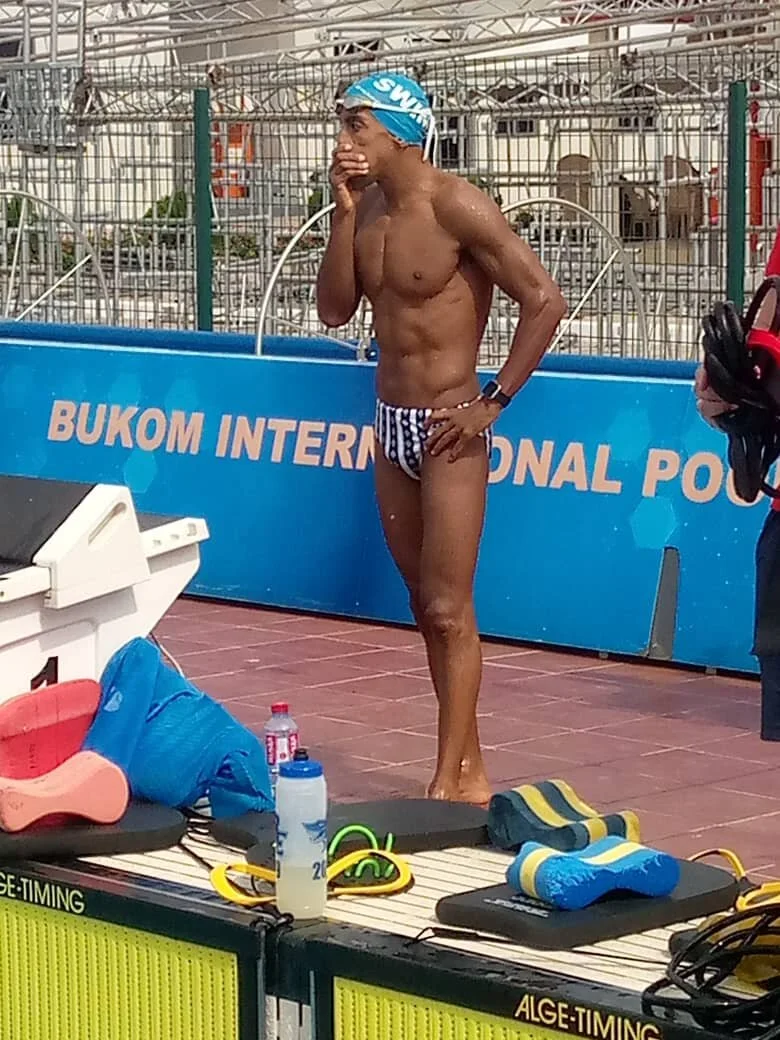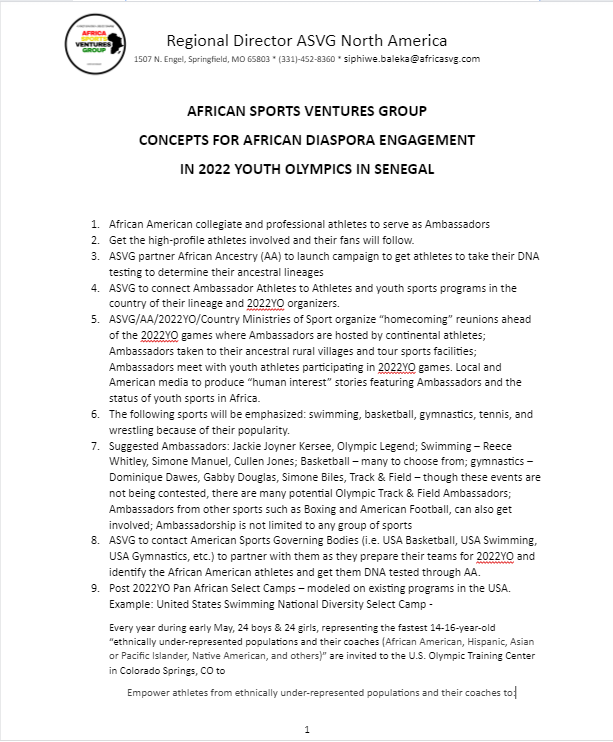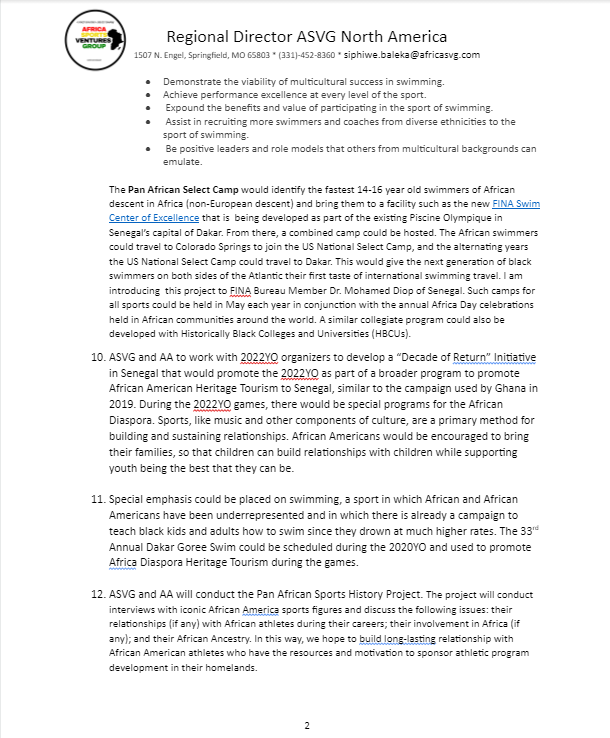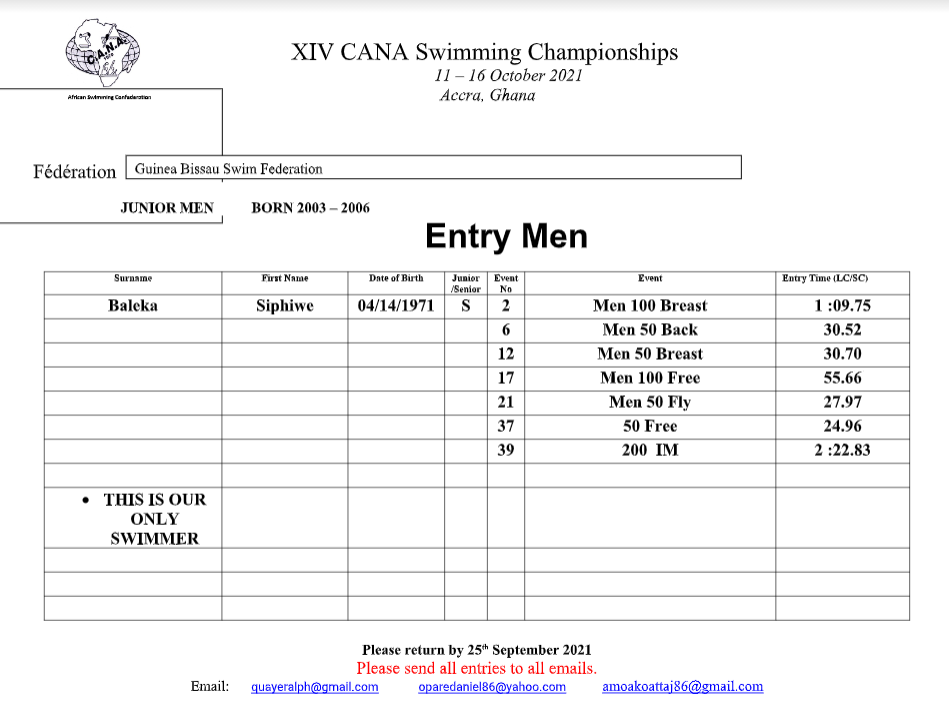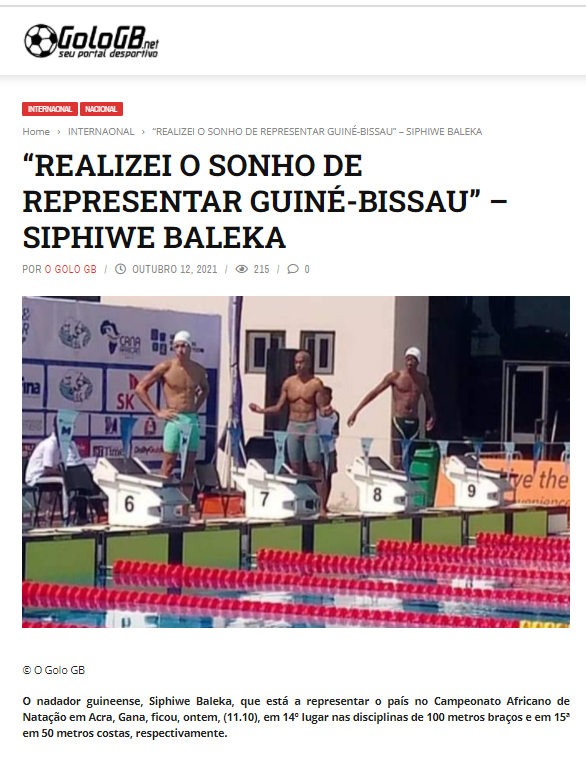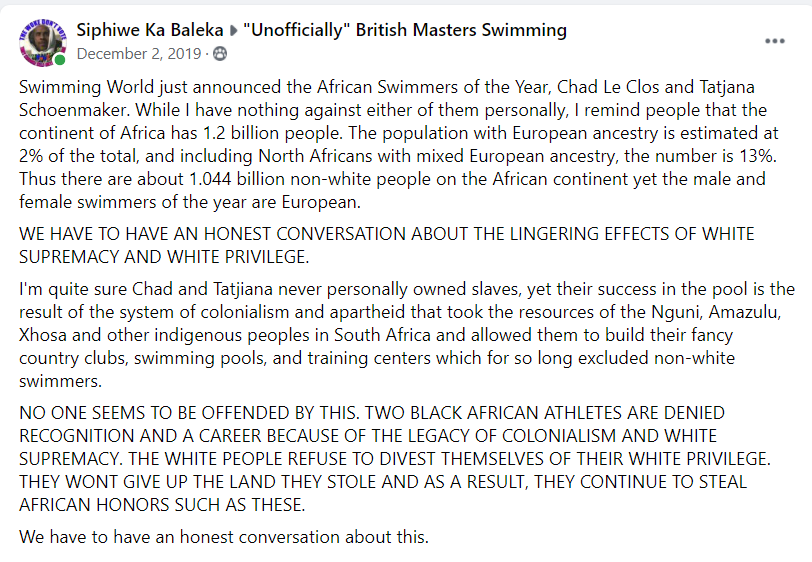GUINEA BISSAU - AFRICA - NOW HAS ONE OF THE BEST MASTERS SWIMMERS IN THE WORLD. BUT WILL ANYONE NOTICE?
The last time I competed in the FINA Masters World Championships in 2017, I won four silver medals but failed to become a world champion. That same year, at the age of 45, I was the oldest competitor in the Arena Pro Swim Series in the United States. My goal now is to win an event at the FINA Masters World Championship next year in Japan, where I will compete against competitors from my own group. In Ghana, I was the oldest competitor, with the second oldest being Marc Pascal Dansou, 38, from Benin.
The Sorrow and Shame
To truly understand the full dimension of my experience at the 14th African Swimming Championships, it’s necessary to go back a few years. In December of 2015 I sent the following email to Mel Goldstein, Vice Chairman FINA Masters Technical Committee:
“From: Siphiwe Baleka <fitnesstrucking@gmail.com>
Date: Wed, Dec 16, 2015 at 5:06 PM
Subject: Competing in Africa in 2016
To: Mel Goldstein <goldsteinmel@sbcglobal.net>
Greetings Mel,
Any opportunity for me to compete somewhere in Africa in 2016?
Siphiwe Baleka www.siphiwebaleka.com”
After receiving no response from Mr. Goldstein, I sent the following email two weeks later to every person I could find connected to swimming in Africa:
“From: Siphiwe Baleka <fitnesstrucking@gmail.com>
Date: Sat, Jan 2, 2016 at 3:02 PM
Subject: Competing in Africa in 2016
To: Mel Goldstein <goldsteinmel@sbcglobal.net>, Laura Hamel <lhamel@usms.org>
Cc: Shaun Adriaanse <canazone4secretariat@gmail.com>, analima29@hotmail.com, info@samastersswimming.com, kennedy@yebo.co.za, guyh@summercon.co.za, wahoosecretary@gmail.com, pjduffy@broll.com, bosmead@gmail.com, mangelos@mweb.co.za, "winrose@telkomsa.net" <winrose@telkomsa.net>, "odendaalannemarie0@gmail.com" <odendaalannemarie0@gmail.com>, "judy.collins@vodamail.co.za" <judy.collins@vodamail.co.za>, "hestersnyman@mweb.co.za" <hestersnyman@mweb.co.za>, marinetzswimmingclub@gmail.com, info@swimafrica.net, sports@ug.edu.gh, headofschool@lincoln.edu.gh, kmoolchandani@lincoln.edu.gh, info@softkenya.com, eth@telecom.net.et, "Green, Robert (DPR)" <robert.green@dc.gov>, Kathy Cooper <blackheritageswimming@gmail.com>
Greetings,
This email is going out to people and organizations that may be interested in my effort to become a World Champion at the 2017 FINA Masters World Championships (Men's 45-49 Age Group). If I am successful, I may become the first African American Masters Swimming World Champion. In preparation, I am planning to connect my passion for swimming with my ancestral heritage, something I did in 2012 when I became the US Masters Swimming National Champion in two evetns (see https://www.growingbolder.com/siphiwe-baleka-in-for-the-long-haul-735035/ ) and then became the first African American to complete Ironman South Africa (see http://www.siphiwebaleka.com/merch/triblackalete).
In preparation for 2017 Masters Swimming World Championships, I am planning my own personal Black Swimming tour in 2016 that begins with the 30th Annual Black History Invitational Swim Meet in Washington, D.C. February 12th through the 16th. Then moves to the 14th Annual National Black Heritage Swim Meet in Cary, North Carolina May 28-29. I am hoping to culminate this tour with a competition in Africa sometime between August and December 2016. The purpose of such a trip would be:
1) interest African Americans in the sport of swimming at all levels, from kids through masters
2) provide historical and cultural components to the sport
3) connect black swimmers in America with black swimmers in Africa
4) propsect on possibilities for coaching black swimmers in Africa
5) compete against some of the best swimmers, white and black, on the African continent
6) provide personal fulfilment returning to the continent
In essence, this campaign is a way for me to combine two of the most important things in my life: my ancestors and swimming.
If you are able to provide any information about any opportunities to compete and participate in any ongoing swimming program on the African continent in the second half of 2016, please don't hesitate to contact me.
To find out more about me, watch the Fox Sports video here: http://www.siphiwebaleka.com/ --Respectfully,
Siphiwe Baleka”
THUS BEGAN MY EFFORT TO COMPETE IM AFRICA AND TO GIVE BACK TO THE SPORT I LOVED AND TO THOSE THAT NEEDED IT THE MOST - BLACK SWIMMERS IN AFRICA!
I went on to win four silver medals at the FINA Masters World Championships in 2017 in Budapest, but I heard nothing from anyone in Africa about Swimming and competing there. And this started my disappointment with FINA and specifically Confederation Africaine de Natation (C.A.N.A) - the African Swimming Federation that governs the sport on the continent.
Why weren't FINA and CANA being more helpful?
Afterall, how often do they receive such inquiries from such an experienced and passionate African American swimmer? Surely I had something valuable to offer CANA and to the next generation of swimmers in Africa. Didn't they want my help? My inability to establish effective communications would continue to be a problem even once I relocated to Africa.
Now, fast forward three years. I heard nothing from no one at FINA or CANA. Then I had the following email exchange that started August 23, 2019 -
“----- Forwarded Message -----
From: Siphiwe Baleka <fitnesstrucking@gmail.com>
To: Kyle Deery <kdeery@usms.org>; Kyle Deery <kdeery@usmastersswimming.org>
Cc: Mel Goldstein <goldsteinmel@sbcglobal.net>;
Sent: Friday, August 23, 2019, 11:56:18 AM EDT
Subject: Contacting Senegal and Guinea Bissau Swim Federations
Greetings Kyle,
My apologies for all the requests lately, but with Laura not at USMS anymore, you are the only one that I know. I need help contacting Dr. Mohamed Diop, FINA Bureau Member from Dakar. I will be traveling to Senegal and Guinea Bissau in late December and I want to do some swim related activities, possibly some swim clinics. I need swimming contacts in these countries. Perhaps USA Swimming can help as well. I've contacted Mel Goldstein previously and he is CC'd on this email as well. I appreciate any help or contacts that you can provide.
-- Respectfully,
Siphiwe Baleka
From: Mel Goldstein <goldsteinmel@sbcglobal.net>
Date: Fri, Aug 23, 2019 at 7:26 PM
Subject: Re: Contacting Senegal and Guinea Bissau Swim Federations
To: Siphiwe Baleka <fitnesstrucking@gmail.com>
Siphiwe
Mohamond is from Senegal not Dakar.. I will forward your message to him and he will contact you if his federation is interested
From: Siphiwe Baleka <fitnesstrucking@gmail.com>
Date: Fri, Aug 23, 2019 at 7:33 PM
Subject: Re: Contacting Senegal and Guinea Bissau Swim Federations
To: Mel Goldstein <goldsteinmel@sbcglobal.net>
Mel, Dakar is the capital of Senegal.
From: Mel Goldstein <goldsteinmel@sbcglobal.net>
Date: Sat, Aug 24, 2019 at 2:24 AM
Subject: Re: Contacting Senegal and Guinea Bissau Swim Federations
To: Siphiwe Baleka <fitnesstrucking@gmail.com>,
Yes, my bad thinking of Doha .. I have sent your message to Mohammod.
Mel Goldstein Education Services | U.S. Masters Swimming
Le 27 août 2019 21:08, Mel Goldstein <goldsteinmel@sbcglobal.net> a écrit :
Mohamed,
I hope your travels were uneventful as was mine... This gentlemen contacted our National Office and wanted to make contact with you... I am reluctant to give out information. If you want to contact him his email is below...
I still want that blue shirt...
Mel Goldstein
Education Services | U.S. Masters Swimming



